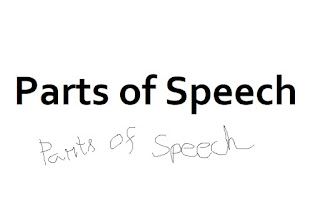Parts of Speech
Noun
A 'noun' is a word used to name a person, place, thing, feeling or idea.
For example:
girl, home, ball, fear, plan
There are different types of nouns.
Common noun
A common noun is used to name ordinary things.
For example:
people: child, doctor, gardener
places: shop, school, park
things: table, magazine,
computer; summer
Proper noun
A proper noun is used to name a particular person, place or thing. It always begins with a capital letter. For example:
people: Anna, Brodie, Robin Hood, Mrs. Singh
places: Scotland, Dublin, Egypt
things: January, Tuesday, RMS Titanic
Collective noun
A collective noun is one word used to name a group of things or animals.
For example:
anthology of stories
bunch of bananas, flowers
choir of singers
the flock of birds, sheep
litter of pups, pigs
the troop of monkeys, scouts
vineyard of grapes
Abstract noun
An abstract noun is a word used to name a quality, feeling or condition. It is something that cannot be seen, heard or touched.
For example:
love, happiness, fear, anger, fun, empathy, apathy, safety, excitement
Pronoun
A 'pronoun' is a word used in place of a noun. A pronoun does the same job as a noun. There are different types of pronouns.
Personal pronoun
A personal pronoun is used to refer to you, me, other people and things. For example:
me you
he him she
her it we
us they them
Possessive pronoun
A possessive pronoun is used to show possession. A possessive pronoun never uses an apostrophe.
For example:
mine yours his
hers its ours
yours theirs whose
Indefinite pronoun
An indefinite pronoun is an `unlimited' pronoun.
For example:
somebody anybody nobody
everybody someone no-one
everyone anything nothing
something everything anyone
A 'verb' is a word used to show action or a state of being. Every sentence should have a verb. There are different types of verbs.
Action verb
An action verb can be used alone in
a sentence. For example:
I love eating chocolate.
My sister always laughs at my
jokes.
Some action verbs are things we cannot see.
For example:
I thought about buying a puppy.
enjoyed the film.
Action verbs also show the 'tense', which indicates the time of the
action or state of being.
Present tense
The action is happening right now. For example:
The baby is crying.
The puppy is barking.
Past tense
The action has already happened. For example:
The baby cried all night.
The puppy barked all day.
Future tense
The action will happen in the future. For example:
The baby will cry.
The puppy will bark all day.
Helping verb
A helping verb is often used with other verbs. It is also called an `auxiliary verb'.
There are 23 helping verbs.
They are:
may might Must
be being been
am are is
was were do
does did should
could would have
had has will
can shall
For example:
My brother has been talking on the phone for hours.
My mum was smiling at my dad.
Not all sentences have or need a helping verb.
One of the most important things to remember is the 'noun-verb agreement'.This is when we consider the singular or plural nature of the noun in the sentence. If we use a singular noun, then we use a singular verb.
For example:
The child is happy.
The farmer was planting seeds.
If we use a plural noun, then we use a plural verb.
For example:
The children are happy.
The farmers were planting seeds.


























No comments:
Post a Comment